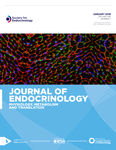Myeloid SIRT1 regulates macrophage infiltration and insulin sensitivity in mice fed a high-fat diet
- Department of Biochemistry, Chonbuk National University Medical School, 567 Baekje-daero, Deokjin-gu, Jeonju, Jeonbuk 561-756, Republic of Korea
1College of Pharmacy, Woosuk University, 443 Samnye-ro, Wanju, Jeonbuk 565-701, Republic of Korea
- Correspondence should be addressed to B-H Park or E J Bae; Emails bhpark{at}jbnu.ac.kr or ejbae{at}woosuk.ac.kr
Abstract
Inflammation is an important factor in the development of insulin resistance. SIRT1, a class 3 histone/protein deacetylase, has anti-inflammatory functions. Myeloid-specific deletion of Sirt1 promotes macrophage infiltration into insulin-sensitive organs and aggravates tissue inflammation. In this study, we investigated how SIRT1 in macrophages alters tissue inflammation in the pancreas as well as liver and adipose tissue, and further explored the role of SIRT1 in locomotion of macrophages. Myeloid-specific Sirt1-deleted mice (mS1KO) and WT littermates were fed a 60% calorie high-fat diet (HFD) for 16 weeks. Tissue inflammation and metabolic phenotypes were compared. Bone marrow macrophages (BMMs) from WT or mS1KO mice were used in in vitro chemotaxis assays and macrophage polarization studies. mS1KO mice fed a HFD exhibited glucose intolerance, reduced insulin secretion, and insulin sensitivity with a slight decrease in body weight. Consistent with these results, pancreatic islets of mS1KO mice fed a HFD displayed decreased mass with profound apoptotic cell damage and increased macrophage infiltration and inflammation. Liver and adipose tissues from mS1KO HFD mice also showed greater accumulation of macrophages and tissue inflammation. Results from in vitro experiments indicated that deletion of myeloid Sirt1 stimulated proinflammatory M1-like polarization of BMMs and augmented the adipocyte-mediated macrophage chemotaxis. The latter effect was accompanied by increased expression and acetylation of focal adhesion kinase, as well as nuclear factor kappa B. Our results indicate that myeloid SIRT1 plays a crucial role in macrophage polarization and chemotaxis, and thus regulates the development of HFD-induced pancreatic inflammation and insulin secretion, and metabolic derangements in liver and adipose tissue.
- Received in final form 18 October 2014
- Accepted 27 October 2014
- Made available online as an Accepted Preprint 27 October 2014
- © 2015 Society for Endocrinology











